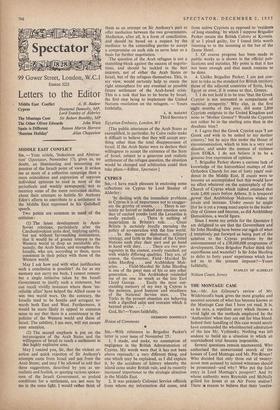Letters to the Editor
Middle East Conflict A. H. &dam Cyprus Desmond Donnelly, MP,
Lord Stanley of Alderley
The Montagu Case Sir Robert Boothby, MP The Other Oliver Edwards John Wain Spain is Different Ramon Martin Herrero
`Russian Holiday' Allan Chappelow
MIDDLE EAST CONFLICT SIR, — Your article, 'Indecision and Abstrac- tion' (Spectator, November 17), gives us, no doubt, an illuminating and interesting ex- pansion of the Israeli point of view. It strikes me as more of a collective campaign than a mere coincidence and expression of separate individual opinions to read in most of the periodicals and weekly newspapers, not to mention some of the more restrained dailies, about their attempts to belittle Sir Anthony Eden's efforts to contribute to a settlement in the Middle East expressed in his Guildhall speech.
Two points are common to most of the criticism: (1) The latest development in Arab- Soviet relations, particularly after the Czechoslovakian arms deal, implying subtly, but not without far-reaching insinuations, that it would be of greater interest to the Western world to drop an unreliable ally, namely, the Arab States, and strengthen the Israelis, who are, according to them, more consistent in their policy with those of the Western world.
May I ask how and with what justification such a conclusion is possible? As far as my memory can carry me back, I cannot remem- ber a single initiative taken by the Israeli Government to jUstify such a statement, but can recall vividly instances where those 'un- reliable allies' have helped the Allied cause to win two world wars. On the contrary, the Israelis tend to be hostile and arrogant to- wards both East and West. Furthermore, it would be more likely to appeal to common sense to say that there is a consistency in the policies of the Western world and those of Israel. The subtlety, I am sure, will not escape your attention.
(2) The second emphasis is put on the intransigence of the Arab States and the willingness of Israel to reach a settlement in this highly explosive area.
May I remind you, Sir, that the violent re- action and quick rejection of Sir Anthony's attempts came from Israel and not from the Arab States; and may I be allowed to add that these suggestions, described by you as un- realistic and foolish, or quoting various spokes- men of the Israeli Government, as prelaid conditions for a settlement, are not seen by me in the same light. would rather think of them as an attempt on Sir Anthony's part to offer mediation between the two governments. Mediation, after all, is a form of conciliation, and should be based on a request by the mediator to the contending parties to accept a compromise on each side to serve later as a basis for further negotiation.
The question of the Arab refugees is not a stumbling-block against the success of negotia- tions, and should be tackled in the best interests, not of either the Arab States or Israel, but of the refugees themselves. This, in my view, would certainly help to create the right atmosphere for any eventual or possible future settlement of the Arab-Israel crisis. This is a task that has to be borne by Israel, the first step being to implement the United Nations resolution on the refugees. — Yours faithfully, A. H. HADAM/I Third Secretary Egyptian Embassy, London, W I
[The public utterances of the Arab States as exemplified, in particular, by Cairo radio make it difficult to believe that they will accept any- thing other than the total disappearance of Israel. If the Arab States were to declare their willingness to accept the existence of the State of Israel, subject to a generous and realistic settlement of the refugee question, the situation would be changed and arbitration could then take place.—Editor, Spectator.]


































 Previous page
Previous page